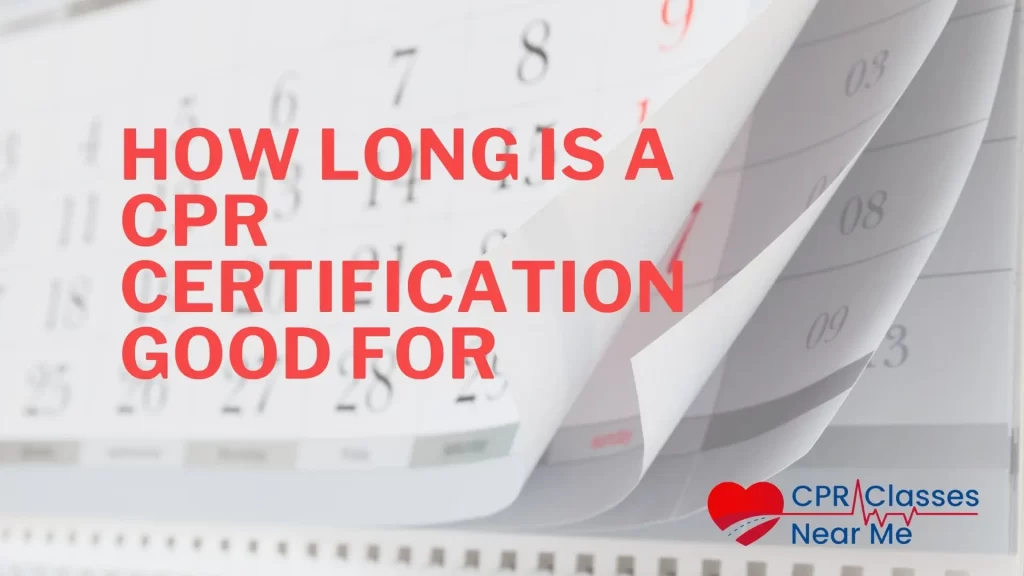
Knowing how long is a CPR certification good for is vital for anyone trained in this life-saving technique. CPR certification has an expiration date, and understanding the validity period is essential to ensure you can respond effectively in an emergency. In this article, we’ll explore the typical duration of CPR training validity and why timely renewal matters.
CPR certification is a credential you earn after completing a course that teaches life-saving techniques. Organizations like the American Heart Association (AHA) and the American Red Cross provide these courses. The certification confirms you have the skills needed to perform CPR in an emergency.
The duration of CPR training validity usually spans one to two years. Here’s a breakdown:
National Safety Council: Validity can be one to two years, depending on the course.
The validity period of CPR certification ensures that individuals stay current with the latest techniques and guidelines. Medical research constantly improves, and CPR methods are updated to reflect the best practices. Renewing your certification regularly keeps your skills sharp and up-to-date.
One of the primary reasons for CPR certification expiration is skill degradation. Research indicates that CPR skills can begin to decline as early as six weeks after training. This decline affects both the quality and speed of performing CPR, which are critical factors during an emergency. Here’s why skill degradation is a concern:
The two-year renewal requirement helps mitigate these issues by ensuring that individuals refresh their skills regularly, maintaining proficiency and readiness to act when needed.
CPR guidelines and techniques are regularly updated based on the latest medical research and best practices. These updates are key for numerous reasons:
Renewing certification ensures that individuals are taught the latest methods and guidelines, enhancing their ability to provide effective and safe life-saving care.
Regular recertification is crucial for maintaining ongoing competency and confidence in administering CPR correctly. Here’s how it helps:
By promoting ongoing competency, regular recertification ensures that individuals remain confident and capable of delivering high-quality CPR. This continuous learning process is essential for preparedness, as it maintains the high standards necessary for effective emergency response.
In summary, the expiration of CPR certification addresses the natural decline in skills over time, the need for updated techniques and knowledge, and the importance of maintaining high competency levels. Regular renewal of CPR certification is not just a bureaucratic requirement but a vital practice to ensure the safety and well-being of individuals in emergencies.
Renewing your CPR certification is essential for several reasons, all of which contribute to maintaining a high standard of emergency preparedness and professional competence. Here are the key reasons why renewal is important:
Medical guidelines and practices evolve based on new research and technological advancements. Here’s why staying current is crucial:
For many professions, maintaining a valid CPR certification is not just beneficial but mandatory. Here’s why:
Regular training and certification renewal are key to building and maintaining the confidence needed to respond effectively in emergencies. Here’s how:
In summary, renewing your CPR certification is essential for staying current with medical guidelines, meeting professional requirements, and maintaining the confidence and preparedness needed to handle emergencies effectively. Regular renewal ensures that you are always equipped with the latest knowledge and skills, enhancing your ability to save lives.
Stay Informed: Keep up with updates from certifying organizations regarding CPR guidelines.
Knowing how long is a CPR certification good for and understanding the CPR certification expiration period is vital for anyone trained in CPR. The validity period of CPR certification ensures you are always ready to provide effective emergency care with the latest knowledge and techniques. Stay proactive about renewing your certification to maintain your preparedness and confidence in life-saving situations.
By understanding the duration of CPR training validity and following these guidelines, you can ensure your CPR skills are always up-to-date. Renewing your certification every two years will keep your knowledge current, align your skills with the latest guidelines, and ensure you are prepared to respond effectively in an emergency situation. Remember to check with the specific certifying organization for their validity periods and renewal requirements.
For those looking to renew or obtain CPR certification, consider enrolling in a course with us at CPR Classes Near Me. Our classes are designed to provide comprehensive and up-to-date training from certified professionals. Whether you’re renewing your certification or becoming certified for the first time, we offer convenient and accessible options to fit your schedule. Stay prepared and confident by ensuring your CPR skills are current and effective. Sign up for a class today and be ready to save lives when it matters most. To book one of our classes please use this calendar or visit one of our location pages.